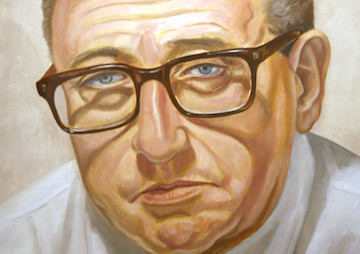Hillary Clinton Boasts Praise by Henry Kissinger — a Man With Blood on His Hands, Critics Say
In her New Hampshire debate with Bernie Sanders, Clinton claimed that she is the true progressive, then proudly mentioned praise from Kissinger -- President Nixon's secretary of state whose policies led to "3, maybe 4 million deaths" globally, writes NYU's Greg Grandin. Portrait of Henry Kissinger on the cover of Time magazine in 1979. (Cliff / CC BY 2.0)
Portrait of Henry Kissinger on the cover of Time magazine in 1979. (Cliff / CC BY 2.0)
On debate night in New Hampshire, Clinton closed her argument that she is a true progressive with an expression of pleasure at being praised by Henry Kissinger, a man whose policies as secretary of state under President Richard Nixon led to “3, maybe 4 million deaths” in Vietnam, Cambodia and elsewhere, writes NYU history professor Greg Grandin at The Nation.
“I was very flattered when Henry Kissinger said I ran the State Department better than anybody had run it in a long time,” Clinton said. Grandin sets Clinton’s remark against Kissinger’s record, asking us to “consider some of Kissinger’s achievements during his tenure as Richard Nixon’s top foreign policy-maker”:
He (1) prolonged the Vietnam War for five pointless years; (2) illegally bombed Cambodia and Laos; (3) goaded Nixon to wiretap staffers and journalists; (4) bore responsibility for three genocides in Cambodia, East Timor, and Bangladesh; (5) urged Nixon to go after Daniel Ellsberg for having released the Pentagon Papers, which set off a chain of events that brought down the Nixon White House; (6) pumped up Pakistan’s ISI, and encouraged it to use political Islam to destabilize Afghanistan; (7) began the US’s arms-for-petrodollars dependency with Saudi Arabia and pre-revolutionary Iran; (8) accelerated needless civil wars in southern Africa that, in the name of supporting white supremacy, left millions dead; (9) supported coups and death squads throughout Latin America; and (10) ingratiated himself with the first-generation neocons, such as Dick Cheney and Paul Wolfowitz, who would take American militarism to its next calamitous level. Read all about it in Kissinger’s Shadow!
A full tally hasn’t been done, but a back-of-the-envelope count would attribute 3, maybe 4 million deaths to Kissinger’s actions, but that number probably undercounts his victims in southern Africa. Pull but one string from the current tangle of today’s multiple foreign policy crises, and odds are it will lead back to something Kissinger did between 1968 and 1977. Over-reliance on Saudi oil? That’s Kissinger. Blowback from the instrumental use of radical Islam to destabilize Soviet allies? Again, Kissinger. An unstable arms race in the Middle East? Check, Kissinger. Sunni-Shia rivalry? Yup, Kissinger. The impasse in Israel-Palestine? Kissinger. Radicalization of Iran? “An act of folly” was how veteran diplomat George Ball described Kissinger’s relationship to the Shah. Militarization of the Persian Gulf? Kissinger, Kissinger, Kissinger.
And yet Clinton continues to call his name, hoping his light bathes her in wisdom.
Hillary Clinton’s progress as a public figure and politician can, in fact, be indexed perfectly by her relationship to Henry Kissinger. In 1970 as a law student at Yale before she met Bill, Hillary Rodham, in April and May was at the center of what she called “the Yale-Cambodia madness,” a series of protests that started around the “New Haven Nine” Black Panther trial but escalated when Nixon, on April 30, announced the invasion of Cambodia—an invasion Kissinger was instrumental in planning and executing. On May 1, the day after Nixon’s speech, “Vietcong flags filled the air; gas masks were distributed. Streaming banners and impromptu chants abounded: ‘Seize the Time!’ ‘End U.S. imperialism around the world!’”
Continue reading here.
— Posted by Alexander Reed Kelly.
Your support matters…Independent journalism is under threat and overshadowed by heavily funded mainstream media.
You can help level the playing field. Become a member.
Your tax-deductible contribution keeps us digging beneath the headlines to give you thought-provoking, investigative reporting and analysis that unearths what's really happening- without compromise.
Give today to support our courageous, independent journalists.






You need to be a supporter to comment.
There are currently no responses to this article.
Be the first to respond.